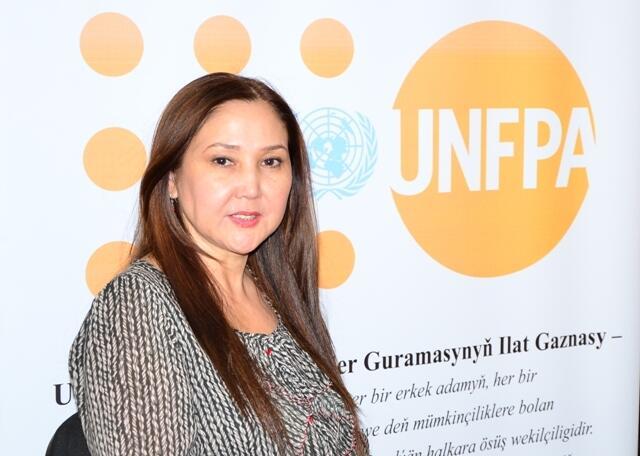Interview with Bayramgul Garabayeva, UNFPA Assistant Representative in Turkmenistan on Turkmenistan’s election to the United Nations Commission on Population and Development
"NT": Turkmenistan is re-elected for the second time to the UN Commission on Population and Development. This structure plays a major role in the implementation of the Programme of Action of the International Conference on Population and Development (ICPD), adopted in 1994 in Cairo, at the national, regional and international levels. This document still retains the status of a framework document in the field of international cooperation on issues related to population, and its implementation will contribute to the achievement of the internationally agreed Sustainable Development Goals. In this context, what are the priorities in the work of the United Nations Population Fund?
B.GARABAEVA: UNFPA, United Nations Population Fund is the leading UN agency to support the countries in achieving the goals of the Programme of Action of the International Conference on Population and Development (ICPD). In Turkmenistan, the UNFPA office was opened in 1992 and since then, three Country Programme Action Plans have been developed and implemented together with the Government. Their successful implementation has achieved sustainable results at the policy level in the areas of reproductive health, maternal and adolescent health, youth policy and gender equality. It is important to note that the results of the numerous surveys conducted in Turkmenistan became the basis for the evidence-based strategies, programmes and action plans, which were jointly developed with the national partners. One of the examples is successful conducting of the Health Behavior in School-Aged Children Survey (HBSC) by the Government of Turkmenistan, first in the Central Asian region. The survey, which used the World Health Organization approved methodology, served as the basis for the development of the evidence-based National Strategy for Maternal, Newborn, Child and Adolescent Health in Turkmenistan. Thus, concrete steps have been taken to implement the ICPD agenda, and Turkmenistan made a worthy contribution to the realization of the Millennium Development Goals. Impressive achievements of Turkmenistan in the field of gender equality, healthcare, education, promotion of principles of healthy lifestyle in the society, especially among young people were noted by Dr. Babatunde Osotemihin, UN Under-Secretary General, UNFPA Executive Director, at the meeting with the President of Turkmenistan Gurbanguly Berdimuhamedov during his visit in August 2015 in Turkmenistan.
"NT": Turkmenistan attaches great attention to strengthening international cooperation for the implementation of the ICPD Programme of Action and has maintained a consistent position in support of its objectives at regional and international levels. And what importance does the international community attach to the country's participation in the work of the UN Commission on Population and Development?
B. Garabayeva: Election of Turkmenistan as a member of the UN Commission on Population and Development for 2012-2015, and again for the period of 2016 - 2020 reflects high level of strategic cooperation of the country with the United Nations system. Commission on Population and Development is an important subsidiary body of the UN Economic and Social Council (ECOSOC). Membership in the Commission allows Turkmenistan to participate in the preparation and review of the issues of statistics, migration, as well as in development of recommendations to the international community and the member-states of the United Nations for the implementation of population policies, population studies, including analysis of the linkages of demographic, social, environmental and economic processes. Positive experiences of individual countries are also important in promoting the ICPD Programme of Action; therefore the achievements and successes of Turkmenistan could also serve as the basis for the development of new recommendations by the Commission.
"NT": Achievements of our country in the ICPD Programme of Action are important prerequisites for further development in these areas. What key directions will shape the work of UNFPA in Turkmenistan in the near future?
B. Garabayeva: Recently, the Fourth Country Program Action Plan was signed between the Government of Turkmenistan and the UNFPA for the period of 2016-2020. This document is based on the Partnership Framework for Development between the United Nations and Turkmenistan for the period of 2016-2020 and consistent with the Sustainable Development Goals.
In the next five years UNFPA work in Turkmenistan will focus on four areas: maternal and newborn health; reproductive health of young people; gender equality; population and development. It is also important to note that UNFPA and Turkmenistan are shifting to a new model of partnership: Turkmenistan government will co-finance the implementation of joint development programmes. This is due to the fact that in recent years Turkmenistan continues to achieve high rates of economic growth, and in 2012 Turkmenistan has been classified by the World Bank as an upper-middle-income country. The country has made substantial progress in the capacity building and service delivery to the population. Therefore, the new programme will focus on reinforcing the international standards and will provide expert support in the implementation of national priorities focused on strengthening institutional systems and processes. UNFPA intends to increase upstream policy interventions and provide our national partners best available technical resources for Turkmenistan’s institutions to develop effective multi-sectoral mechanisms for population data collection, processing, analysis, and dissemination to ensure evidence-based programming for gender equality, youth development and reproductive health.
-- translated from Russian.


